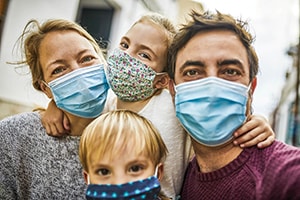Dear Editor,
The Covid pandemic has continued to drag on for nearly two years, changing all of our lives in ways great and small. For our two daughters, ages 5 and 7, this pandemic has lasted for a significant portion of their lives.
This was most evident when we first went to the local library after it reopened to the public this summer and our younger daughter — who was 3 when the pandemic began — had no memories of ever having been there before. Since starting kindergarten, she has never eaten in the school cafeteria or gathered with families in the gymnasium for a weekly schoolwide community meeting like we used to do.
We are thrilled to have these community engagements once again within reach with the recent approval of the Pfizer vaccine for children ages 5 to 11. While we are grateful that researchers took their time to ensure the vaccine was safe for children, it feels like we have all been waiting for this moment for a very long time.
Covid vaccines are now among the most studied medical interventions in history, with more than 7 billion doses administered worldwide to nearly 4 billion people. In the United States alone, more than 245 million doses of the Pfizer vaccine have been administered, with a remarkable safety record.
We have thus far taken some comfort in knowing that children were less likely to suffer serious illness or to die from Covid, but that doesn’t mean there is no risk from the disease. According to the CDC, more than 8,300 children ages 5 to 11 have been hospitalized from Covid, a third of whom were admitted to the intensive care unit. Saddest of all, 173 children ages 5 to 11 have died of Covid in our country.
In fact, despite their lower overall risk from Covid, children are actually at the highest risk of multi-system inflammatory syndrome, a scary and sometimes life-threatening condition that can result from Covid infection. And some infected children can develop “long Covid,” remaining ill for months.
Compare that to the study of the Pfizer vaccine, where there were no recorded serious side effects in children 5 to 11.
Across all age groups, unvaccinated people are six times more likely to contract symptomatic Covid. Unvaccinated people are a whopping 12 times more likely to die from Covid if they do contract it.
All of this can seem like just numbers until you’re sitting by the bedside of your own sick child, knowing that there was something you could have done to prevent it.
As if protecting our own children’s safety is not enough, vaccinating children protects the lives of others as well. Researchers at Oxford recently confirmed that people vaccinated with the Pfizer vaccine who had breakthrough infections were both less contagious and were contagious for a shorter period of time (in addition to being far less likely to contract Covid in the first place).
As a result, according to CDC researcher Dr. Sara Oliver, the decrease in Covid transmission from vaccinating children as soon as possible may prevent 600,000 new cases of Covid by March of next year, in addition to reducing the possibility of a new, more contagious variant emerging (Delta on steroids).
Reports of childhood deaths from Covid often highlight the fact that the child had additional health problems, so it can seem easy for parents to dismiss the dangers of Covid if your own child is healthy. But it should go without saying that someone else’s immunocompromised child is still a child worth protecting! And hospitalization rates from Covid for Black and brown children are three times higher than for white children, further highlighting the racial disparity in health outcomes.
Please don’t get your information on vaccines and medicine from blogposts, YouTube, or social media. Don’t even get it from us. It’s perfectly normal to have questions about the best choices to keep your child healthy, so please reach out to your child’s pediatrician — a medical expert who you know and trust — with any questions or concerns. And take comfort in knowing that Vermont’s pediatricians and other doctors are getting themselves and their own children vaccinated.
You can sign up to get your children vaccinated on the Vermont Dept. of Health website. Getting vaccinated is quick and easy and is absolutely free.
Just as Vermonters have come together countless times during this pandemic, getting our children vaccinated is the next step in ensuring a brighter and safer future for us all.
Tom and Julia Rogers, Stowe
(Their two daughters, who attend Stowe Elementary School, were vaccinated with their first dose of the Pfizer vaccine earlier this week.




